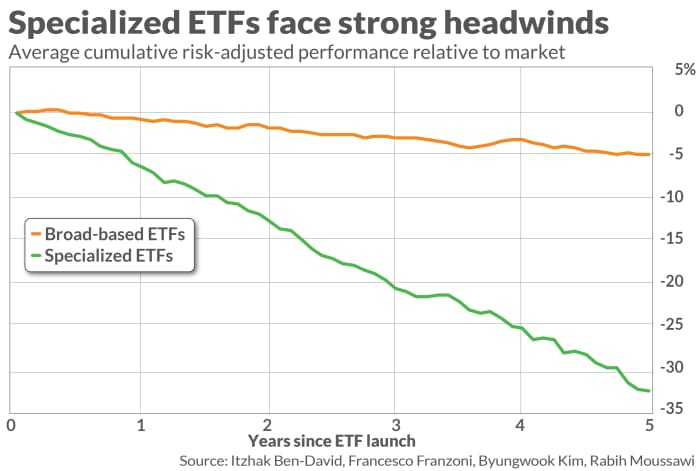

The recent approval of bitcoin exchange-traded funds (ETFs) by the SEC raises the question of whether these investment options have a place in retirement portfolios. While the availability of bitcoin ETFs in 401(k)s and self-directed IRAs may seem enticing to some investors, there are experts who remain skeptical. Itzhak Ben-David, a finance professor at The Ohio State University, argues that the price of bitcoin should be based on its intrinsic value, rather than on the existence of an ETF. He suggests that the dependence on an ETF for the price of bitcoin indicates the reliance on speculative investor activity, rather than true value. Additionally, historical data on specialized ETFs suggests that they often underperform compared to broad-based ETFs and the overall market. Based on these factors, it is possible that bitcoin ETFs may not be the optimal choice for retirement portfolios.
The SEC’s decision on bitcoin ETFs
The recent decision by the Securities and Exchange Commission (SEC) to approve bitcoin exchange-traded funds (ETFs) has opened up retirement portfolios to this digital currency. This decision has significant implications for retirement investing, as it provides an opportunity for individuals to include bitcoin in their 401(k)s and self-directed IRAs. However, before considering the inclusion of bitcoin ETFs in retirement portfolios, it is important to understand the potential impact of these specialized ETFs on the underlying value of bitcoin.
Bitcoin’s underlying value should not be affected by the existence of an ETF
One argument against the inclusion of bitcoin ETFs in retirement portfolios is that the existence of an ETF should not change the underlying value of the cryptocurrency. According to finance professor Itzhak Ben-David from The Ohio State University, the price of bitcoin should be based on its intrinsic value, rather than whether there is an ETF available. Ben-David argues that the dependence of bitcoin’s price on the existence of an ETF indicates that it is influenced by the size of the crowd that speculates on its value, rather than its intrinsic worth. Therefore, the introduction of bitcoin ETFs should not significantly impact the true value of bitcoin.
The potential for both the new ETFs and bitcoin to fall in value
Despite the SEC’s decision to approve bitcoin ETFs, there is a possibility that both the new ETFs and bitcoin itself may experience a decline in value. Ben-David’s research suggests that specialized ETFs at their launch are often invested in overvalued securities. This is because providers of specialized ETFs tend to focus on themes that are currently popular among investors, and as a result, these ETFs may be invested in securities that are trading at inflated prices. Moreover, the recent rally in bitcoin following the SEC’s decision indicates that investor sentiment towards the cryptocurrency may be overly optimistic. Such frothy sentiment has the potential to generate further increases in bitcoin’s value, but it can also lead to significant drops in price. Therefore, investors should be aware of the possibility of both bitcoin and the new ETFs falling in value.
The impact of specialized ETFs
Specialized ETFs, including bitcoin ETFs, often focus on themes that are riding a wave of investor enthusiasm. This is because it would not make business sense for providers to launch ETFs in which few investors are interested. However, this tendency of specialized ETFs to invest in popular themes also means that they may be invested in overvalued securities at their launch. Data shows that on average, specialized ETFs underperform broad-based ETFs and the overall market. This underperformance can last for at least five years after the ETF’s launch. When applying this historical performance to the new bitcoin ETFs, it suggests that investors should exercise caution and be aware that these specialized ETFs may not generate strong returns.
Bitcoin’s rally and investor sentiment
The recent rally in bitcoin following the SEC’s decision to approve bitcoin ETFs suggests that investor sentiment towards the cryptocurrency may be frothy. Investor sentiment refers to the overall attitude and emotions of investors towards a particular asset. When sentiment becomes overly optimistic, it can lead to unsustainable price increases and, ultimately, a correction or drop in value. The creation of bitcoin ETFs may contribute to this frothy sentiment, as it generates further excitement and interest in the cryptocurrency. However, investors should be cautious of relying solely on investor sentiment when making investment decisions, as it can be a volatile and unpredictable factor.
Assessing bitcoin’s fair value
Assessing the fair value of bitcoin is a challenging task due to the lack of traditional financial metrics associated with the cryptocurrency. Unlike stocks, which can be evaluated based on earnings and dividends, bitcoin does not have comparable metrics. To address this challenge, some analysts turn to models like Metcalfe’s Law, which attempts to estimate the fair value of bitcoin based on network effects and the number of active users. According to this model, bitcoin’s current price is around a quarter higher than its estimated fair value. While this model has shown some success in identifying periods of overvaluation and undervaluation in bitcoin, it is important to note that it is not infallible and should be used as one tool among many when assessing the value of bitcoin.
Potential performance of bitcoin ETFs
Given the historical underperformance of specialized ETFs and the potential overvaluation of bitcoin, there is a possibility that bitcoin ETFs may lag behind low-cost broad market index funds. These index funds, which track a broad stock market index, have traditionally provided consistent and reliable returns over the long term. The combination of bitcoin’s overvaluation and frothy investor sentiment may contribute to lower performance for these ETFs over the next five years. Investors considering bitcoin ETFs should carefully weigh the potential risks and rewards and assess whether these specialized ETFs align with their long-term investment goals.
Conclusion
In conclusion, the SEC’s decision to approve bitcoin ETFs opens up retirement portfolios to this digital currency. However, retirement investors should approach the inclusion of these ETFs with caution. The underlying value of bitcoin should be the main consideration, rather than the existence of ETFs. Moreover, based on historical performance and the potential for overvaluation and frothy investor sentiment, bitcoin ETFs may not perform as well as low-cost broad market index funds. As with any investment decision, investors should conduct thorough research, assess their risk tolerance, and consult with a financial advisor before making any investment decisions related to bitcoin ETFs.

RELATED POSTS
View all







